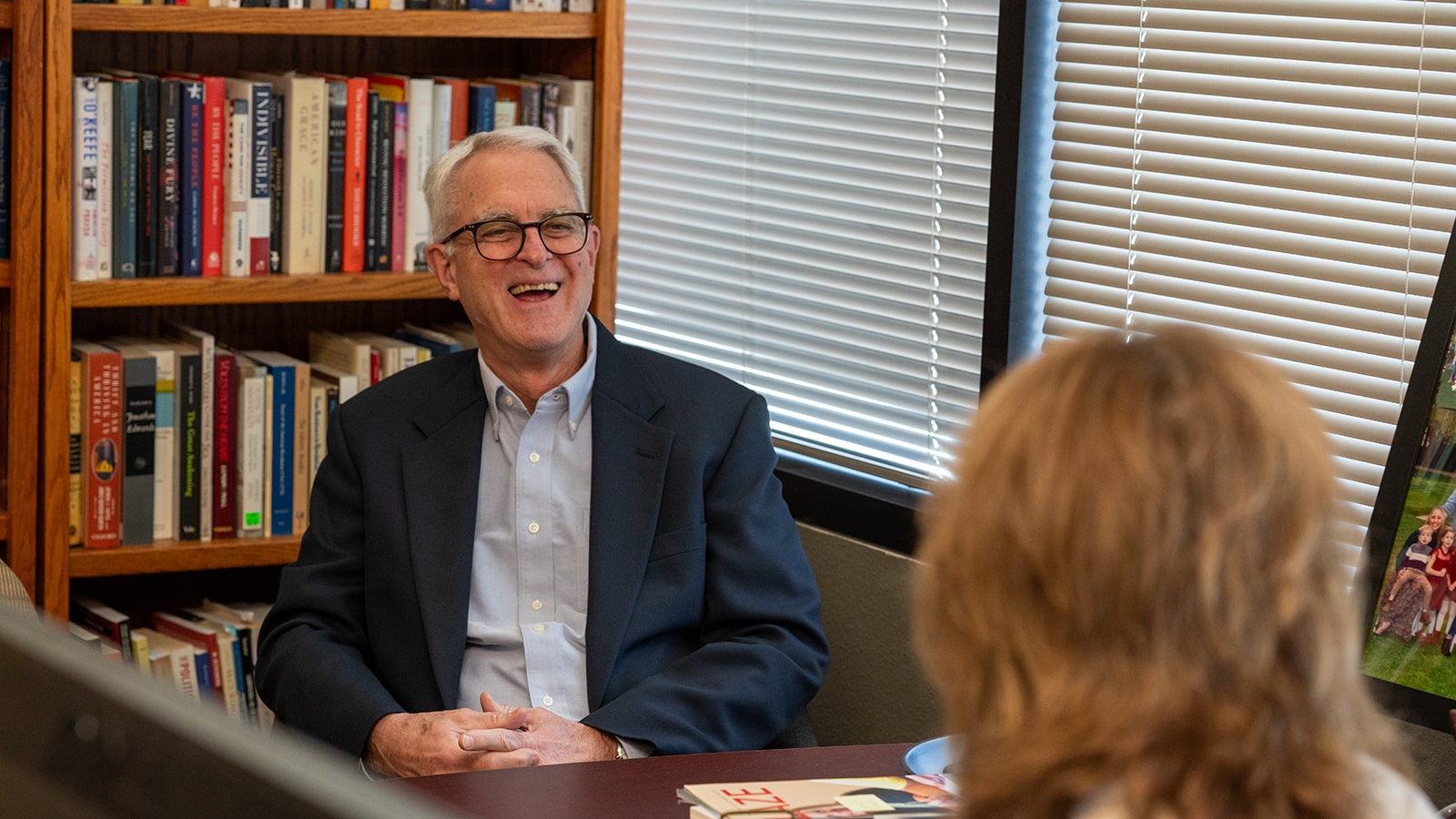It’s an early February morning in Nashville as Dr. George Barna settles in to talk about his latest research focusing on worldview in America. Across the table is Roger Marsh, longtime host of The Bottom Line, a daily national conservative Christian radio show.
This conversation focusing on the loss of biblical worldview among our nation’s preteens is the first of a grueling schedule of two dozen interviews for Dr. Barna over the next few days at the annual National Religious Broadcasters (NRB) convention.
Anyone familiar with NRB knows this annual convention is the place to be for Christian communicators. And it is no surprise that Barna and his worldview research are such a big draw for the nation’s most influential media members attending the NRB event.
As Director of Research at the Cultural Research Center at Arizona Christian University, Barna does more than 200 media interviews every year. He also participates in at least another two dozen in-person appearances, along with writing dozens of media articles and op-eds.
It’s little wonder that Barna is often identified as “the most quoted person in the Christian Church today” and has been the leading authority on biblical worldview and trends in the American church for nearly four decades.
But Barna didn’t set out to be a national voice in worldview research—far from it.
Instead, he claims to be an introvert, more comfortable in the company of numbers and data sets, than in front of a camera or speaking to a sold-out audience.
His love of statistics started with his boyhood fascination with baseball cards. Not the player pictures or career narratives—but the flip side of the card, packed with nearly microscopic rows of numbers and averages.
“The numbers spoke to me,” Barna recalls. “They told a story.”
“Those years of digesting the numbers made me very comfortable with math and with numbers to tell a story,” he explains. “Since I have always loved writing narratives as well, it seems only natural now that I combined the two skills into writing books, articles, and reports based on statistical data.”
While in graduate school at Rutgers University, he and his now-wife, Nancy, were planning to get married, and the church required them to complete a premarital counseling program. When the program was done, they had a private meeting with the church’s priest.
According to Barna, “During that private meeting I asked him a bunch of theological and faith-related questions. He blew up and told me I could never question the church. At that moment I knew that church was not right for us.”
But Barna’s intellectual curiosity was piqued, and after getting married in the church, Barna and his wife “went on a search for God.”
“After a few false starts we found a fundamentalist church that was Bible-oriented, and we accepted Christ there,” says Barna. “Within just a few months, that church blew us out with their rules and unbiblical boundaries, but we found another church that was more sane, and we stuck to the faith because of our growing relationship with Jesus.”
As he recalls, those early detours on their journey were foundational to their faith. “The bad church experiences we had led us to focus on Jesus rather than churches, programs, or charismatic personalities.”
Like his faith journey, Barna’s road to becoming the nation’s leading researcher on faith and culture also took some unexpected twists.
He actually started his career after graduate school with a traditional marketing research firm—serving clients such as Chevrolet, Colgate Palmolive, Proctor & Gamble, and networks ABC and NBC.
Sprinkled into that list of secular clients were a few projects for Christian ministries. And after working on one campaign for a faith-based client, their marketing and media representative asked him to leave his big firm and become their director of marketing research and direct marketing. He accepted the offer and moved with his wife Nancy to Chicago.
That transition would ignite Barna’s passion for exploring how marketing research could serve ministries and the Christian body—something that was new territory back in the early 1980s.
As Barna’s time at the marketing firm in Chicago came to a close, he and Nancy moved back to California. That’s where Barna Research Group, which would eventually become the nation’s leader in faith-related research, started in their garage in Hollywood in 1984.
Shortly after returning to California, Barna received an unexpected call from the Vice President of Research at Disney, who happened to be a former colleague, asking if he’d be interested in doing some research for Disney.
From that connection, Barna Research Group became the marketing research firm for the Disney Channel, giving the burgeoning research company a strong financial foundation that would enable it to spend significant time developing marketing research methods for churches and Christian ministries, which was Barna’s true passion.
“It became obvious that ministries had neither the budgets nor expertise to commission marketing research,” Barna recalls, “even though they desperately needed the information because they were making decisions based on anecdotes, assumptions, emotion, and tradition.”
During that time period, Barna Research Group leveraged the profits from its Disney research to underwrite its cutting-edge national studies regarding faith. As he explains, “We essentially gave the research away to churches and parachurch ministries in order to help their ministry efforts be more effective and efficient.”
For the next 25 years, Barna Research Group conducted groundbreaking research and became the industry standard for research into matters of religion, faith, church, and worldview. Then, following a season where George felt led to make a change, he sold Barna Research Group in 2009.
Over the years, the veteran researcher took on a wide variety of projects—including studies for four presidential campaigns, research on possible themes and storylines for TV shows and movies, developing cultural trend-tracking processes, doing studies of leadership and behavioral change for multiple branches of the military, and many others.
Of all the projects he’s done, which does Barna see as most significant?
He points to an early worldview project for Charles Colson, founder of Prison Fellowship and the Colson Center for Christian Worldview, which led to Colson’s classic, How Now Shall We Live (1998). Barna also noted a large, complicated study he completed, examining how God transforms lives, resulting in the book Maximum Faith: Live Like Jesus (2011). He also singles out his political and election research that identified a group known as SAGE-Cons, Spiritually Active Governance Engaged Conservative Christians, illuminating that group’s emergence as a powerful force in American politics.
And Barna sees two of his recent projects as some of his most significant. One has been the Student Worldview Inventory at Arizona Christian University, a worldview measure of the University’s student body; and his research into effective ministry to children, which he shares in his latest book, Raising Spiritual Champions: Nurturing Your Child’s Heart, Mind and Soul (published by Arizona Christian University Press in 2023).
And along the way, he’s written an astonishing 60 books. “I love writing more than anything else I get to do,” he explained. “Research is complicated to explain and articles usually don’t do justice to the breadth and depth of the findings. Books allow a contextualized presentation of facts in a narrative form and have a greater potential to take a person beyond temporary changes to transformation.”
Why so many books?
“I have had the privilege of conducting unique studies of many facets of faith,” he explained. “If you peruse the catalogue, you’ll find it covers research on many faith-related topics, ranging from evangelism, discipleship, and leadership to stewardship, worship, faith practices, and more. My goal has been to provide a holistic perspective of biblical ministry, and it has taken years and many books to provide that outlook.”
After more than 40 years doing research, Barna now is the Director of Research of the Cultural Research Center at Arizona Christian University. He is also a professor at the University.
It was during a conference at an oceanside resort in California in 2019 that the idea for the Cultural Research Center was born. The organization was ultimately co-founded about a year later by Barna and his wife, Nancy, along with ACU President Len Munsil and his wife, Tracy, who serves as CRC’s Executive Director.
So why this stop along the journey?
“ACU allows me to continue to do unique research and to have a platform for disseminating the information,” Barna explained.
“Our emphasis is on cultural transformation, which of course happens one life at a time. Our worldview research, through the Cultural Research Center, enables us to give people a pathway toward becoming who God made them to be, and to help facilitate the advancement of His Kingdom on Earth,” he said.
Despite running the gauntlet of wall-to-wall meetings at the NRB conference, Barna is tireless in calling our nation to embrace the biblical worldview.
As he sees it—and as his research bears out—from a worldview and spiritual perspective, our nation has been going in the wrong direction for the last 25 years or so.
But he remains clear-eyed about his life’s assignment to continue to alert Christian leaders to the challenges we face.
“I’m determined to finish well,” he says. “I am committed to focusing on the things that I think matter the most and make the biggest difference—biblical worldview, ministry to children, and effective discipleship.”
Although he loves to spend time watching the Yankees, playing guitar, relaxing on the beach, and hanging out with his three grown daughters, their families, and three grandchildren (ages 5 to 9), he doesn’t have plans to stop anytime soon.
As Barna explains, “I don’t believe ‘retirement’ is a biblical concept—in fact, there is no Hebrew word for retirement—so I expect to mentor successors for CRC, continue writing, help to disciple my grandchildren, and hopefully do a few more research projects of significance.”
And he’ll likely do an interview or two and write a few more books along the way.



